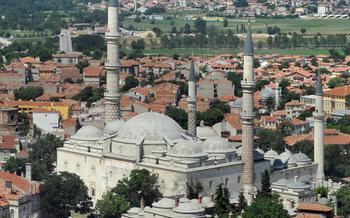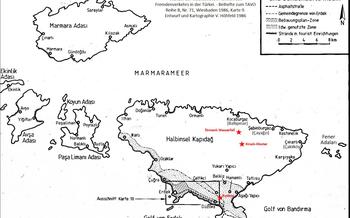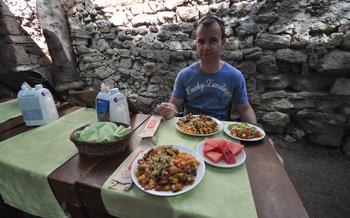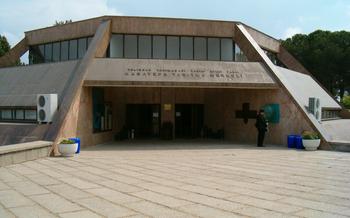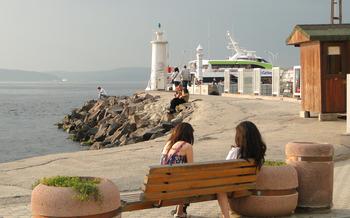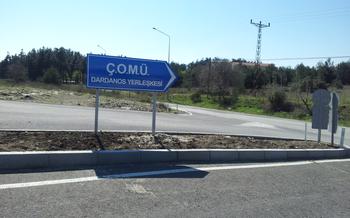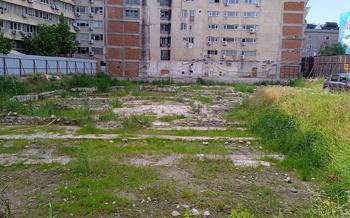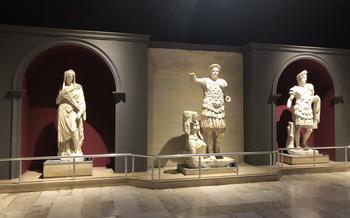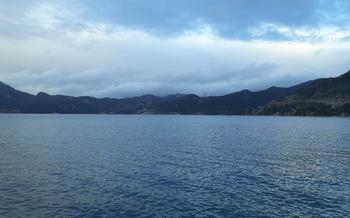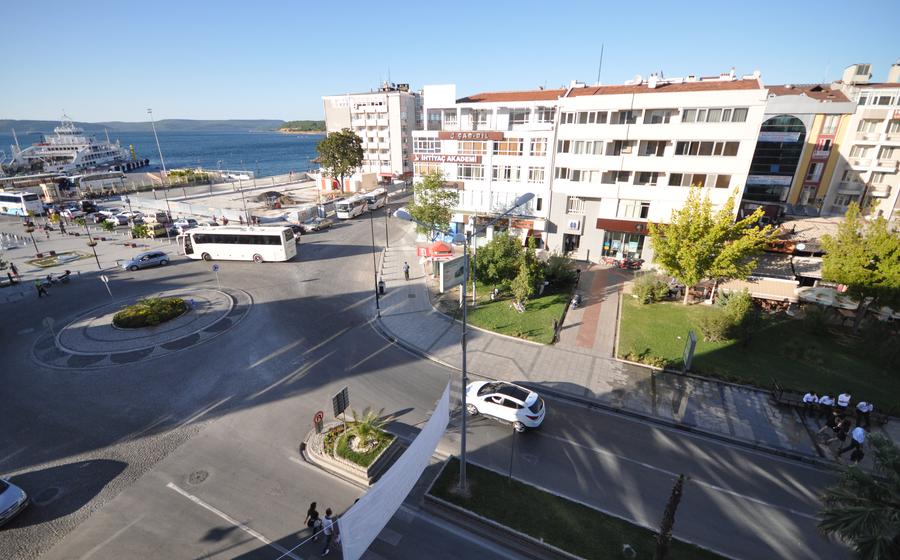
Tenedos Antique City
- Exploring the City Walls
- Exploring the Theater of Tenedos: A Legacy of Greek Artistry
- The Temple of Apollo Smintheus:
- The Agora of Tenedos:
- The Museum of Tenedos:
- The Byzantine Church of the Koimesis
- The Vineyards of Bozcaada:
- Exploring the Vineyards:
- Local Varieties and Flavors:
- Annual Wine Festival:
- A Taste of Bozcaada:
- The Olive Groves of Bozcaada
- The Cuisine of Bozcaada
- The Crafts and Handicrafts of Bozcaada
- The Festivals and Events of Bozcaada:
- Getting to Bozcaada: A Scenic Journey to the Island
- Ferry Services: Embracing the Sea Breeze
- Ferry Schedules and Fares: Planning Your Voyage
- Alternative Transportation Options: Exclusive Island Access
- Planning Your Journey: Embracing Flexibility
- Insider Tip: Exploring Bozcaada by Bicycle
Exploring the City Walls
The ancient city of Tenedos is surrounded by an impressive fortification system, a testament to the city's strategic importance and military prowess. The city walls, constructed with massive stone blocks, stand as a formidable barrier, protecting the city from invaders and ensuring the safety of its inhabitants.
The walls feature a series of gates and towers, providing access to the city and allowing for the movement of troops and supplies. These gates, adorned with intricate carvings and inscriptions, served as ceremonial entrances and defensive checkpoints, adding to the grandeur and security of the city.
From atop the city walls, visitors can enjoy panoramic views of the surrounding landscape, taking in the beauty of the Aegean Sea, the lush countryside, and the distant mountains. The walls offer a unique perspective on the city's layout and its relationship with its natural surroundings.
Exploring the city walls is a captivating experience, transporting visitors back in time to an era of ancient conflicts and heroic battles. As you walk along the ramparts, you can imagine the soldiers patrolling the walls, keeping watch over the city and its people, ready to defend their homeland against any threat.
Exploring the Theater of Tenedos: A Legacy of Greek Artistry
The Theater of Tenedos, a captivating remnant of ancient Greek artistry, stands as a testament to the city's cultural heritage. Constructed in the 3rd century BC, the theater's architectural design showcases the ingenuity and precision of Greek craftsmanship. The semi-circular auditorium, with its tiers of stone seats, can accommodate over 3,000 spectators, offering them an optimal view of the stage.
The theater's acoustics are remarkable, a result of careful design and construction techniques. The curved shape of the auditorium and the placement of the stage ensure that the actors' voices carry clearly to all corners of the theater, creating an immersive experience for the audience.
Over the centuries, the theater has undergone various restoration efforts to preserve its grandeur. In recent years, extensive renovations have been undertaken to restore the seating areas, stage, and surrounding structures, bringing the theater closer to its original splendor. Today, the Theater of Tenedos stands as a vibrant reminder of the city's rich cultural past, hosting performances, concerts, and other events that celebrate the enduring legacy of Greek drama.
The Temple of Apollo Smintheus:
Amidst the ruins of Tenedos, the Temple of Apollo Smintheus stands as a testament to the city's deep-rooted connection with the Greek deity. Dedicated to Apollo, the god of music, poetry, and prophecy, the temple was once a sacred sanctuary revered by the ancient Greeks.
Excavations at the temple site have revealed impressive architectural remains, including foundations, columns, and fragments of sculptures. These remnants hint at the grandeur and artistry that once adorned the temple, inviting visitors to imagine the splendor of its former glory.
Apollo Smintheus held a special significance in Greek mythology. The epithet "Smintheus" is believed to derive from the Greek word "sminthos," meaning "mouse," suggesting Apollo's role as a protector against rodents that threatened crops. The temple's location on the island of Tenedos, known for its vast wheat fields, further reinforces this association.
Ongoing archaeological research at the temple site continues to shed light on its history and significance. Scholars study the architectural elements, inscriptions, and artifacts found at the temple to piece together the story of this sacred place. Through these efforts, the Temple of Apollo Smintheus remains a source of fascination and wonder for visitors seeking to connect with the ancient world.
The Agora of Tenedos:
The ancient agora of Tenedos, once the bustling heart of the city, is a testament to the city's vibrant commercial and social life. Excavations have revealed the agora's impressive layout, featuring a central square surrounded by colonnaded stoas. These stoas housed shops, stalls, and workshops, where merchants sold their wares, ranging from pottery and textiles to exotic spices and luxury goods.
In the center of the agora stood a monumental fountain, providing a refreshing oasis for weary travelers and locals alike. Public buildings, such as the bouleuterion (council chamber) and the prytaneion (government building), lined the edges of the square, symbolizing the city's civic and administrative functions.
The agora was not merely a place of commerce but also a crucial venue for social interactions and political gatherings. Citizens came together to discuss important issues, celebrate festivals, and engage in lively debates. The agora played a pivotal role in shaping the political and social fabric of ancient Tenedos, facilitating the exchange of ideas and fostering a sense of community among its diverse inhabitants.
The Museum of Tenedos:
The Museum of Tenedos is a treasure trove of artifacts discovered from the ancient city. It is located near the harbor and houses a collection of pottery, sculptures, coins, and other relics that provide a glimpse into the rich history of Tenedos.
The museum exhibits showcase the artistry and craftsmanship of the ancient inhabitants of the island. Visitors can admire intricate pottery adorned with mythological scenes, delicate sculptures depicting gods and goddesses, and a collection of coins that bear witness to the city's role in ancient trade.
The Museum of Tenedos plays a vital role in preserving and presenting the history of the island. It offers guided tours and educational programs that help visitors understand the significance of the artifacts and the story they tell about ancient Tenedos.
Through its collection and exhibitions, the Museum of Tenedos invites visitors to embark on a journey through time, exploring the rich cultural heritage of this ancient city.
The Byzantine Church of the Koimesis
Amidst the ruins of Tenedos, the Byzantine Church of the Koimesis stands as a testament to the city's rich Christian heritage. Constructed during the 11th century, this well-preserved church showcases the architectural prowess and artistic sensibilities of the Byzantine era. Its sturdy walls, intricate stonework, and graceful arches evoke a sense of awe and reverence.
The interior of the church reveals a harmonious blend of Byzantine aesthetics and functionality. The spacious nave, once filled with the faithful, is adorned with elegant columns and arches that support the domed ceiling. The walls are embellished with vibrant frescoes depicting scenes from the Bible, offering a glimpse into the religious beliefs and iconography of the time.
Beyond its architectural significance, the Church of the Koimesis holds great historical value. It served as a spiritual center for the Christian community of Tenedos during the Byzantine period. Here, the faithful gathered for worship, celebrated religious festivals, and sought solace in prayer. The church's enduring presence speaks to the resilience and devotion of the Christian community that once thrived within the ancient city.
Today, the Church of the Koimesis stands as a symbol of Tenedos' multifaceted history. Its ruins invite visitors to contemplate the city's Byzantine past, appreciate the artistry of its architecture, and reflect on the enduring power of faith. Ongoing conservation efforts aim to preserve this sacred site, ensuring that its legacy continues to inspire and captivate generations to come.
The Vineyards of Bozcaada:
Bozcaada is renowned for its viticultural heritage, producing unique and flavorful wines. The island's fertile soils, temperate climate, and skilled vintners have created a thriving wine industry, attracting wine enthusiasts from around the world.
Exploring the Vineyards:
Visitors to Bozcaada can embark on a journey through the island's vineyards, discovering the secrets behind the exceptional wines produced here. Guided tours and tastings are offered by local wineries, allowing visitors to learn about the different grape varieties, winemaking techniques, and the history of viticulture on the island.
Local Varieties and Flavors:
Bozcaada wines are characterized by their distinct flavors and aromas, influenced by the island's unique terroir. Visitors can sample a wide range of wines, from crisp whites to robust reds, each expressing the essence of the island's vineyards.
Annual Wine Festival:
The annual Bozcaada Wine Festival is a highlight of the island's cultural calendar, attracting wine lovers and enthusiasts from far and wide. The festival showcases the best of Bozcaada's wines, along with local cuisine, live music, and traditional dancing, creating a vibrant and festive atmosphere.
A Taste of Bozcaada:
For those seeking a truly immersive experience, staying at a vineyard or winery on Bozcaada is a must. These accommodations offer guests the opportunity to witness the winemaking process firsthand, enjoy private tastings, and savor the flavors of the island's wines in a tranquil and picturesque setting.
The Olive Groves of Bozcaada
Bozcaada is renowned for its extensive olive groves, covering fertile lands and contributing significantly to the island's economy and culture. The island's unique climate and soil conditions create an ideal environment for olive cultivation, resulting in the production of high-quality olive oil. Visitors to Bozcaada can immerse themselves in the island's olive oil tradition through various experiences.
Olive oil tasting sessions are a popular activity, allowing visitors to sample the distinct flavors and aromas of Bozcaada's olive oils. These tastings are often conducted at local olive mills or farms, where visitors can learn about the olive oil production process and the different varieties of olives grown on the island.
Guided tours of traditional olive mills offer a glimpse into the history and techniques of olive oil production in Bozcaada. Visitors can witness the traditional methods used to extract oil from olives, including stone mills and hydraulic presses. These tours provide a deeper understanding of the island's olive oil heritage and the dedication of local producers.
For those who wish to delve deeper into the culinary delights of Bozcaada, cooking classes featuring olive oil are available. These classes teach participants how to incorporate olive oil into various dishes, showcasing its versatility and health benefits. Visitors can learn to prepare traditional island recipes using fresh, locally sourced ingredients, creating a memorable culinary experience.
The annual Olive Festival, held on Bozcaada, celebrates the island's olive oil tradition and brings together local producers, artisans, and visitors. During the festival, visitors can sample a variety of olive oils, enjoy traditional music and dance performances, and participate in olive-related activities. The festival is a vibrant showcase of Bozcaada's olive oil culture and a must-attend event for those interested in this culinary treasure.
The Cuisine of Bozcaada
The culinary scene of Bozcaada is a delightful blend of Turkish, Greek, and Mediterranean flavors, reflecting the island's rich cultural heritage. The dishes are prepared using fresh, locally sourced ingredients, such as seafood, olive oil, and aromatic herbs.
One of the must-try dishes on the island is the "Bozcaada Levreği," a grilled sea bass, expertly cooked and served with a drizzle of olive oil, lemon, and herbs. The "Ahtapot Salatası," an octopus salad, is another local specialty, offering a unique and flavorful combination of textures.
For those who prefer vegetarian options, the "Zeytinyağlı Enginar" (artichokes cooked in olive oil) and the "Kabak Çiçeği Dolması" (stuffed zucchini flowers) are excellent choices, showcasing the island's fresh produce and culinary creativity.
No meal in Bozcaada is complete without sampling the local wines. The island boasts a thriving wine industry, with several wineries producing award-winning varieties. Visitors can enjoy wine tastings at the vineyards and savor the unique flavors of Bozcaada's terroir.
Whether it's savoring the freshest seafood at a seaside tavern, indulging in traditional Turkish meze platters, or sipping on local wines amidst the vineyards, the cuisine of Bozcaada promises a culinary adventure that will delight the taste buds and leave visitors with lasting memories.
The Crafts and Handicrafts of Bozcaada
Bozcaada is home to a thriving community of artisans and craftsmen who create beautiful handmade ceramics, jewelry, textiles, and other crafts. These artisans use traditional techniques passed down through generations, and their work reflects the rich cultural heritage of the island. Visitors to Bozcaada can find a variety of workshops and galleries showcasing the work of local artisans, providing a unique opportunity to learn about and purchase traditional crafts.
The ceramics of Bozcaada are particularly renowned, with a distinctive style characterized by bright colors and intricate patterns. Artisans use local clay to create a variety of functional and decorative pieces, including plates, bowls, vases, and tiles. Jewelry makers on the island create unique pieces using gold, silver, and semi-precious stones, often incorporating traditional motifs and designs.
Textile artisans in Bozcaada weave beautiful rugs, carpets, and other textiles using traditional looms. These textiles are often made from wool or cotton and feature vibrant colors and intricate patterns. Visitors can also find a variety of other crafts on the island, such as handmade leather goods, wood carvings, and traditional musical instruments.
The preservation and promotion of traditional crafts are important to the community of Bozcaada. Local artisans work to keep traditional techniques alive while also creating new and innovative designs. Visitors to the island can support these artisans by purchasing their handmade goods, helping to ensure that the rich cultural heritage of Bozcaada continues to thrive.
The Festivals and Events of Bozcaada:
Bozcaada is a vibrant island that comes alive with festivals and events throughout the year, showcasing its rich culture and traditions. The annual Bozcaada Wine Festival is a highlight, attracting wine enthusiasts from across the region. Held in September, the festival features local wineries, wine tastings, culinary delights, and live music, providing a unique opportunity to experience the island's viticultural heritage.
Another popular event is the Bozcaada International Jazz Festival, which brings together renowned jazz musicians from around the world. Held in July, the festival offers a diverse lineup of performances, from traditional jazz to contemporary fusion. Visitors can enjoy live music in various venues across the island, creating a lively and energetic atmosphere.
Throughout the year, Bozcaada hosts various cultural events, including art exhibitions, theater performances, and traditional dance shows. These events provide a glimpse into the island's rich history and heritage, allowing visitors to immerse themselves in the local culture.
Participating in these festivals and events is an excellent way to experience the island's vibrant atmosphere and cultural diversity. Visitors can engage with locals, learn about traditional customs, and create lasting memories of their time on Bozcaada.
Getting to Bozcaada: A Scenic Journey to the Island
Ferry Services: Embracing the Sea Breeze
To embrace the allure of Bozcaada, embark on a delightful ferry journey from the mainland. Regular ferry services connect the picturesque coastal towns of Çanakkale and Geyikli to the serene shores of Bozcaada. Immerse yourself in the tranquility of the sea as you sail towards the island, allowing the gentle breeze to caress your skin and the mesmerizing views to captivate your senses.
Ferry Schedules and Fares: Planning Your Voyage
Plan your journey wisely by checking the ferry schedules in advance to ensure a smooth and hassle-free experience. Ferry fares vary depending on the time of year, the type of ferry, and the duration of the journey. Consider purchasing round-trip tickets for added convenience and potential savings.
Alternative Transportation Options: Exclusive Island Access
For those seeking a more exclusive journey to Bozcaada, consider chartering a private boat or hopping on a small plane. These options offer a unique perspective of the island, allowing you to admire its rugged coastline and pristine waters from above. While these alternatives may come at a higher cost, they provide an unforgettable and personalized experience.
Planning Your Journey: Embracing Flexibility
When planning your trip to Bozcaada, flexibility is key. Ferry schedules can be subject to changes due to weather conditions or unforeseen circumstances. Embrace the spontaneous nature of island travel and be prepared to adjust your itinerary if necessary. Consider arriving on the island early in the day to make the most of your time exploring its wonders.
Insider Tip: Exploring Bozcaada by Bicycle
For an unforgettable experience on Bozcaada, consider exploring the island by bicycle. Cycling offers a unique and leisurely way to discover the island's hidden gems, from secluded beaches and picturesque vineyards to charming villages nestled amidst rolling hills.
Bicycle rental shops are conveniently located in Bozcaada Town, offering a variety of bikes to suit different preferences and needs. Once you have your wheels, embark on a cycling adventure along the island's scenic coastal roads, immersing yourself in the breathtaking views of the Aegean Sea.
One recommended route takes you along the northern coast, passing by pristine beaches such as Ayazma and Habbele. Stop for a refreshing swim in the crystal-clear waters, soak up the sun on the sandy shores, and enjoy a picnic lunch surrounded by nature's beauty.
As you cycle further, you'll encounter lush vineyards, where you can take a break to sample some of Bozcaada's renowned wines. Visit local wineries for a guided tour and tasting, learning about the island's viticultural heritage and savoring the unique flavors of its wines.
Cycling on Bozcaada is not only a delightful way to explore the island but also a sustainable and eco-friendly option. Embrace the freedom of pedaling through the countryside, breathing in the fresh air, and connecting with the island's natural beauty. Whether you're an experienced cyclist or a beginner looking for a leisurely ride, Bozcaada offers an unforgettable cycling experience for all.
